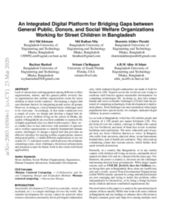ABSTRACT
Lack of interactions and engagement among different welfare organizations, donors, and the general public severely limits opportunities that welfare organizations create for street children in third-world countries. Developing a digital hub can eliminate barriers by integrating people across all groups. However, in doing so, critical human factor challenges need to be overcome. Accordingly, in this study conducted over a couple of years, we design and develop a digital hub deployed to serve children living on the streets in Dhaka, the capital of Bangladesh (an excellent candidate to represent life in highly populated cities in a third-world country). Here, we - a) conduct face-to-face interviews with members of representative welfare organizations to identify fundamental humancentric challenges; b) design a digital hub that provides an effective interface for pairing welfare organizations, donors, and general public; c) enable different organizations to use our system 24×7, and report results; and d) present critical humancomputing issues, more challenges, theoretical advancement, and potential scopes for future work in this realm with broad applicability.

